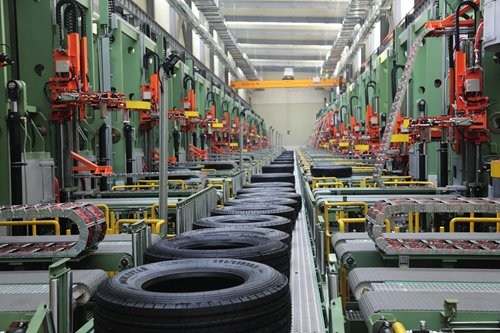
The new smart production line in Doublestar's industrial 4.0 intelligent plant in Qingdao, East China's Shandong Province (Photo/Courtesy of Doublestar Group)
In 2016, Qingdao-based tire manufacturer Doublestar Group created the first industrial 4.0 intelligent plant in the world, a breakthrough which came several years after the company began suffering from sluggish profits. The company is one of the many examples of old and traditional Chinese manufacturers that have sought to transform themselves through upgrading and adopting intelligent technologies. The local government of the West Coast New Area has also been committed to bringing in advanced technology from foreign countries like Germany, exemplifying its strong commitments to the "Made in China 2025" plan, which aims to upgrade the manufacturing industry.
At a tire factory in Qingdao, East China's Shandong Province, automatic machines build tires in a rhythmic fashion on the production line.
The factory's clean floor, bright workshop and smart production line are characteristics that separate it from the traditional, dark and dirty tire plants that came before it.
Doublestar Group, a 95-year-old State-owned enterprise based in the Qingdao West Coast New Area, started the construction of its new intelligence plant in March 2014, marking the start of a new journey it calls "embracing second chances".
"The old production line required more than 1,000 employees," an employee of Doublestar, who prefers to remain anonymous, told the Global Times on Thursday.
"Now, productivity has largely been improved as the new smart production line only needs 256 people [for operation]," she said.
A novel start
Doublestar transformed into a tire manufacturer from a shoemaker after it acquired Qingdao Huaqing Tire Co in 2002.
But after several years of development, many problems emerged within Doublestar's old-style production mode, which required high levels of manpower yet generated low productivity, said Li Yong, vice general manager of Doublestar.
In the years before its transformation, ''Doublestar had been largely lagging behind the average level of net profit within the domestic tire sector, product quality, energy-saving ability and reputation due to its outdated workshop, equipment and techniques," Li told the Global Times on Thursday.
"We noticed that the company's ways of thinking were old fashioned and that employees were conservative, like other old State-owned enterprises. This meant that words like informatization and intelligence were strange to them," Li said.
As it soon began to realize its growth potential, the firm subsequently initiated its transformation by firstly exploring concepts of "openness" and ''innovation''. Through this process, Doublestar began stepping up efforts in learning about advanced technology and experiences from prominent global counterpart companies, according to Li.
The company tried to nurture employees' Internet genes and to create an industrial 4.0 intelligent plant.
Transformation and upgrading is a difficult process, Li said, noting that this is particularly due to the fact that no company within the global tire industry prior to Doublestar had sought an industry 4.0 transformation pathway.
It took Doublestar, now a pioneer, 20 months to coordinate experts, acquire partner resources across the world and complete design plans, steps which were then followed by hundreds of improvement rounds. Accordingly, the actual construction process of the new plant took one year.
Under pressure, Doublestar then shifted its equipment from old to new kinetic energy, which, as a result, saw 60 percent of outdated capacity and products become replaced.
But advantages soon emerged, with the company's manual efficiency enhancing by nearly 200 percent and the product defect rate decreasing by more than 80 percent.


















































